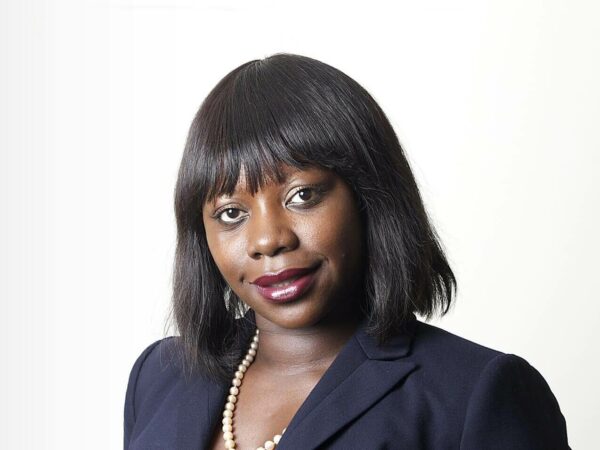Black History Month – Natasha Shotunde

After first hearing Natasha Shotunde speak passionately about race equality and social mobility, I immediately joined the Black Barristers Network, of which she is Chair. I’d recommend listening to the Lincoln’s Inn Diversity and Inclusion Forum: Bar, BAME and Covid-19 recording.
“I grew up in Tottenham, in a single parent household with my mother who is of Nigerian/ Kenyan descent. She instilled the importance of education in me.” The value of education is something I also grew up hearing from my parents.
Natasha was one of the first tranche of Social Mobility Advocates for the Bar Council’s #IAMTHEBAR campaign in 2018. She appeared with Chris Dawe QC, Rachel Spearing and the Secret Barrister in a live stream event “Different Faces of the Bar”, a social mobility event aimed at individuals contemplating a career in law in 2018.
She is candid about the obstacles she faced: not being accepted to the Russell Group universities that she wanted, obtaining a 2:1 (rather than a 1st), the £15,000 cost of training for the Bar and the three years it took to secure pupillage. She featured in “The changing face of the modern Bar”, an article about social mobility and her journey to the Bar. She appeared on Channel 5 News alongside Dawn Foster after the publication of “Elitist Britain” by The Sutton Trust, in which they discussed social mobility in their respective professions. In “Bar conference: What do junior barristers make of the issues facing the profession?” she wrote about a need to change the perception of the Bar as an elitist profession to increase diversity, the need to challenge discrimination against barristers, judicial bullying, harassment at the Bar, retention of women, fair allocation of work, mentoring schemes and diversity on recruitment panels.
She also wrote a candid article about imposter syndrome for Counsel Magazine “Overcoming Imposter Syndrome”. When she speaks about imposter syndrome, I understand where she is coming from: the internal obstacle that persists and which you have to fight. As she says: “You’ve made it to the Bar – spread your wings, trust in your abilities and be your authentic self.”
Like me, Natasha undertook pro bono work and took advantage of the generosity and encouragement available from others at the Bar and through the Inns. She was awarded a Certificate of Recognition by the Bar Pro Bono Unit (now known as Advocate) in 2017. She is a great example that people from ordinary backgrounds can make it at the Bar, and be heard. We should all work hard to ensure that the Bar is accessible to all who have talent. She has given talks at schools, including her own secondary school – Hornsey School for Girls – to inspire students to consider the Bar.
“Work hard (in studies, networking, employment and pro bono work) and do not be afraid to ask for help from people with links to the profession that you meet along the way. As my mother would say, the worst they can say is no.”
Natasha is an elected member of the Bar Council and sits on the Equality, Diversity and Social Mobility Committee. She also sits on the Bar Modernisation Working Group and the Race Working Group. She has spoken out about racism at the Bar in various events including the Lincoln’s Inn EDI Forum and the Legal Services Board Stakeholder Summit on 24 September 2020.
She set up the Black Barristers’ Network with Mavis Amonoo-Acquah in 2019. Their core mission is to promote the growth of Black Barristers through support, visibility and community outreach. Their work includes external liaison with other bodies such as the Bar Council, BSB, MoJ and other legal organisations. As Chair, she is the face of the Network and liaises with external bodies to promote the interests of Black Barristers and highlight issues of structural racism within the profession. Their projects include a mentoring scheme, the Schools Springboard Project (which was due to launch in June 2020 but is postponed due to Covid-19) and a series of surveys gathering data on the working lives of Black Barristers, with a particular focus on racism. They intend to use this data to campaign for change. More information can be found on their newly launched website.
Last year, Natasha appeared on a panel at the “Red Lion Chambers celebrates 100 Years of Women in Law” event in November 2019 where she raised the need for the celebrations of those 100 years to include the achievements of Black women. She was listed in a MyLondon article entitled “Black History Month: 18 inspirational black Londoners everyone in the capital should know about”. This spotlighted Londoners “who have done or are doing amazing things in our city.”
It came as no surprise to me to hear that Natasha has been shortlisted for the Future Leader: Diversity and Inclusion award at the UK Bar Awards 2020.
This piece has been written by Morayo Fagborun Bennett and, whilst personal to her, is published as part of Hardwicke’s support of Black History Month. You can see the other pieces written by members and staff by clicking here.

